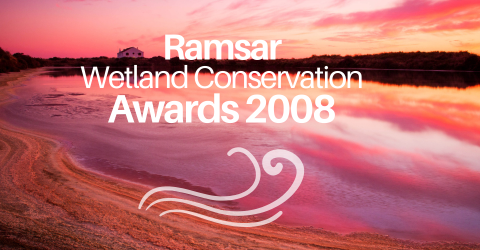
Award for Education 2008
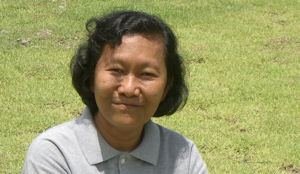
Dr Sansanee Choowaew, Mahidol University, Thailand
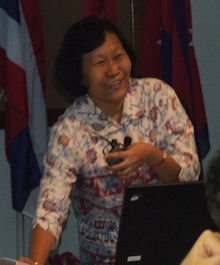
Dr Choowaew is being recognized for her exceptional contribution to wetland management, education, capacity building, and training in Thailand and in Asia. She has been involved in the cause of wetland conservation for more than 15 years. Her contribution to wetland conservation and management in Thailand, in the Mekong region, and in Asia is considerable. She has initiated, led and participated in many wetland management training programmes and research programmes and has also formed a network of alumni and resource persons in Asia to continue and build on the training. Dr Choowaew has served on several official policy-making committees in Thailand and in the Mekong region. Dr Choowaew is also being nominated with a highlight on her achievements in the fields of wetland education, awareness, capacity building, and training. She has published a large number of educational and public awareness material, been interviewed many times in the media, and participated in learning projects inter alia in the framework of UNESCO. In addition to her achievements as an academician and a teacher, Dr Choowaew is an excellent networker and has been largely involved with communities and their representatives, valuing traditional knowledge and culture related to wetlands. She has been associated with the Ramsar Center Japan since 1992 and has taken a leadership role for wetland education activities of the RJC since then, as well as serving on the steering committee for several Asian Wetland Symposium meetings.
---Interview with Sansanee Choowaew---
Dr Sansanee Choowaew, Associate Professor, Faculty of Environment and Resource Studies, Mahidol University,Thailand, is being recognized, in the Award category "Education", for her exceptional contribution to wetland management, education, capacity building, and training in Thailand and in Asia. She has been involved in the cause of wetland conservation for more than 15 years, and her contribution to wetland conservation and management in Thailand, in the Mekong region, and in Asia is considerable.
Good afternoon. Before we turn to some questions about specific aspects of your work, could you give us an overview of your career thus far?
A city girl born in Bangkok in a government official’s family, I graduated with a B.Sc. in General Science (Chemistry – Biology) from Chulalongkorn University, Thailand, in 1977, and then pursued an M.Sc. in Technology of Environmental Management from Mahidol University, Thailand, in 1981 and a PhD in Environmental Planning from the University of Melbourne in 1987.
It was always my determination to work in the public sector. After I received the first degree, I was about to join the Royal Thai Air Force, but decided to continue studying at Mahidol University where my life entered into the environmental field. I started working with local communities and accumulated hands-on experience in rural areas all over Thailand. While doing field experiments on forage cropsat Tung Kula Ronghai Land Development Station, Roi Et Province of the Northeast, I also worked as an agricultural researcher as temporary staff with the Department of Land Development, Ministry of Agriculture and Cooperatives. In 1980, I started my government career as a scientist with the Office of the Prime Minister Secretariat. After my MSc, I received the Royal Thai Government Scholarship to do my PhD in Australia, where I went to study in 1983. I did my PhD research on rural land use modeling and planning for Thailand and then returned to work at Mahidol University in 1987.
At the Faculty of Environment and Resource Studies, Mahidol University, I was a Lecturer (1982–1990), Assistant Professor (1990–2005), and now Associate Professor since 2005, with administrative positions as well, as Chair of the Technology of Environmental Management MSc Programme, Associate Dean for Research, Advisor for the Technology of Information Management on Environment and Natural Resources MSc Programme, committee member of the PhD International Programme in Environment and Resource Studies to the present and Associate Dean for Research and International Relations (1999 – 2003). Currently, I am the Director of the Natural Resource Management MSc International Programme (since 2003), Director of the Wetlands Management Research and Training Center (WMRTC) (since 2005), and Director of Bung Boraphet Research and Training Institute (BBRTI) (since 2007).
How did you first become interested in wetlands?
The academic programmes in Environment and Resource Studies at Mahidol University are typically field-based and multi- and inter-disciplinary, emphasizing hands-on exercises and real-time experience, especially in rural areas. Since 1988, I have taken my MSc students on field trips 4-5 times a year working with local communities on how they use and manage natural resources and how they cope with changes and development impacts. I have seen how much local people depend on natural resources from rivers, streams, riverine flooded forests, floodplains, marshes, ponds and lakes, for their subsistence and livelihoods. I realized that these natural ecosystems are vitally important natural resource bases of local people’s lives. They call these ecosystems their supermarkets, refrigerators, and wombs of ecosystems – reflecting the importance for fish breeding and spawning. They may not have much money, but they have plenty of food for all family members. At that time, I had not known or used the word “wetlands”.
I was first introduced to the term “wetlands” in the early 1990s, when I and my colleagues at the Faculty of Environment and Resource Studies worked with colleagues at the Department of Land Development in the programme named “Inventory and Management of Wetlands in the Lower Mekong Basin (Basinwide)” of the Mekong Secretariat.
The term “wetlands” was very new to Thais, and the first difficulty I met was what to call wetlands in Thai. I recall that when I translated the first wetland book, a Thai version of Dugan, P.J. (ed.), Wetland Conservation: a Review of Current Issues and Required Action(IUCN, 1990), which was published in 1994, I consulted the Royal Institute many times and had long discussions with so many colleagues in various agencies, before ending up using the Thai term “phuen thi chum nam” for “wetlands”.
Since then for over 15 years, I have been continuously working with various groups of people, agencies and organizations on various issues and aspects related to wetlands in Thailand, in the Mekong Region, and in Asia.
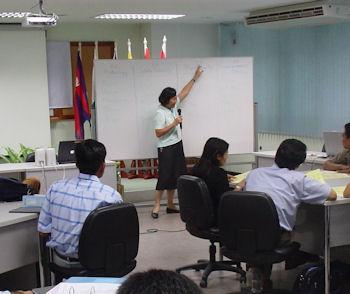
You have been involved in many aspects of wetland conservation, from teaching, research, and training to policy-making and awareness raising with the public. Could you fill us in on some of those activities – first, how about teaching?
Well, I introduced “Wetland Management” as a subject in the curriculum of both Thai and international postgraduate programmes. Since 2003, I have taught and supervised a considerable number of postgraduate research theses at the MSc and PhD levels on a wide range of wetland-related issues and natural resource management topics, including wetland ecology, biodiversity, socioeconomics, valuation, information systems, and education. For the MSc International Programme in Natural Resource Management, my students from various countries, including Afganistan, Bhutan, Cameroon, Indonesia, Lao PDR, Myanmar, Nepal, Philippines, Sri Lanka, Thailand, and Vietnam, are introduced to wetland ecology and wetland management. Besides Mahidol University, I also serve as an invited lecturer, thesis supervisor and reader on wetland issues for other academic institutions, including Chulalongkorn University, Prince of Songkhla University, and Mahasarakham University.
And your present research interests?
At Mahidol University, the Wetland Management Research and Training Center (WMRTC) was established in 2005 and the Bung Boraphet Research and Training Institute (BBRTI) was established in 2007. These two centers have a goal to serve as regional and national centers for wetland research, training, information dissemination, communication, education and public awareness.
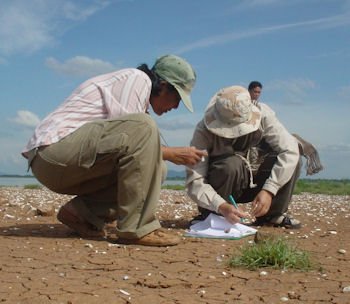
My past and on-going research includes environmental awareness building strategies in the Mekong Basin; a national inventory of wetlands of Thailand (the central and eastern regions); social and economic aspects of fisheries within riverine ecosystems impacted by hydropower development projecst; management planning for the Sam Roi Yot wetlands, which became Thailand’s 11th Ramsar site in 2008; biodiversity conservation in ricefields, freshwater marshes, riverine floodplains and flooded forests; wise use of wetland resources, sustainable/sufficiency livelihoods and poverty alleviation; wetland resource valuation; functions and services of urban and constructed wetlands; traditional culture related to wetland management; wetland restoration; and wetlands and climate change.
Once I was asked by a high-ranking official during a meeting (where we tried to explain why a quick decision on a highway construction along the coastline should not be made without careful and complete assessment of the environmental impacts) what the economic benefits would be if there is no coastal highway project and eight pairs of rare migratory birds are protected nesting on the beach. From that day, although I do not quite like putting monetary values on the enormously invaluable wetland ecosystems because they can always be underestimated, I have decided to do more research on wetland valuation. Most politicians and decision makers do need some tangible figures to understand and compare between possible options.
We understand that you have been closely involved in developing training programmes in wetland management.
In fact, the very first “Training Course on Wetland Ecology and Management” for government officials from the Mekong riparian countries was organized by the Faculty of Environment and Resource Studies, Mahidol University, in 1992.
I and my colleagues in different universities in the Mekong Basin discussed common training needs on various occasions when our academic paths crossed, and we agreed to establish the University Network for Wetland Research and Training in the Mekong Region. Mahidol University hosted the 1st Signing Ceremony of the Agreement on Academic Cooperation in 2003 and the 2nd Signing Ceremony of the Extended Agreement in 2008. This Network currently comprises 13 university members in five countries of Southeast Asia (Cambodia, Lao PDR, Malaysia, Thailand, and Vietnam), and they have agreed to take turns hosting an annual training course using wetlands in their own countries for fieldwork. From 2003 to 2008, six regional training courses on “Wetland Ecology and Management in the Lower Mekong Region” have been organized by the network, for a total of 144 junior lecturers, researchers, government officials, wetland managers and practitioners, from five countries in the Mekong Basin (Cambodia, Lao PDR, Myanmar, Thailand and Vietnam).
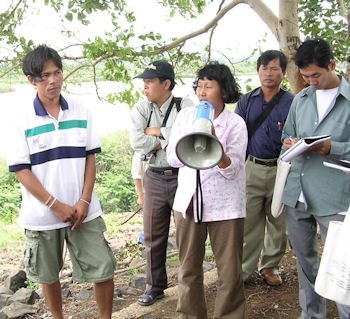
In 2005-2007, I led the Training Organizing Team, served as the Training Course Director and Lead Instructor coordinating, supervising and teaching in courses on Tropical Wetland Management, in cooperation with The Columbo Plan Secretariat and Thailand International Development Cooperation Agency, and on Sustainable Use and Management of Coastal Wetlandsin cooperation with the UNEP/GEF South China Sea Project, for a total of 57 wetland managers, practitioners, and lecturers from 15 countries in Asia.
I also led the team of faculty and staff and organized local training courses on Basic GIS for Wetland Management, Basic Wetland Ecology, and Advanced GIS for Wetland Management, for a total of 60 local government officials, staff of community-based organizations, and local community leaders in Thailand.
Since then, we have formed and maintained the Asian Wetlands Network (in short, AsianWetNet), a network of more than 350 alumni and resource persons from over 30 countries, in order to continue communication, information sharing and exchange, consultation, and future collaboration.
I myself have learned lots and lots of new things from the trainees each year. I enjoy working with such very nice groups of people who have shown their great interest, enthusiasm, active participation, energy and effort as well as willingness to work hard in wetland ecosystems. I am truly confident that all of them will be an important task force in wetland education, research, training, and wetland biodiversity conservation and management in their own countries and region-wide. We still keep in touch with one another.
The most difficult task for an academician, I would say, is seeking funding, which I am not good at it at all. I remember very well, once when we were (as always) short of budget for running one of the training courses, the Dean and I went to meet with one foundation that focused its work on highland issues and had informed us that wetlands were not their priority. We tried our best and kept on explaining and trying to convince them that highlands and wetlands are closely linked. After almost two hours, they agreed to support participants from the country dominated with mountainous areas. Their kind support significantly contributed to the success of that training course.
In the sphere of policy-making, you seem to have a good deal of experience as well.
The Office of Natural Resources and Environmental Policy and Planning and the Biodiversity Bureau are excellent national focal points, very actively coordinating Thailand’s implementation of the Convention on Wetlands and the Convention on Biodiversity. With an incredibly small number of staff, a tremendous amount of important work has been done for wetlands in Thailand. I truly admire their dedication and great efforts, and I am very proud to have been working with them since 1994.
I’ve also been a member of working groups under the Subcommittee for Wetland Management of Thailand, which drafted Thailand’s National Wetland Policy and Action Plan during 1994-1995, and have served on the steering committee for a number of projects as part of the IUCN/UNDP/GEF Mekong River Basin Wetland Biodiversity Conservation and Sustainable Use Programme. In addition, I served as a regional consultant and national expert for several valuable projects for the Environment Unit of the Mekong River Commission Secretariat. Since 2003, I’ve been serving as a regional expert for the wetland component of the UNEP/GEF South China Sea Project.
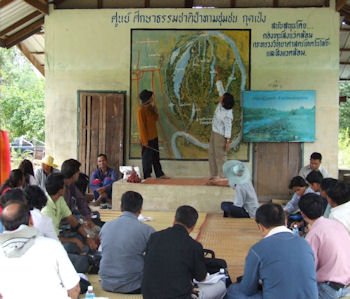
The Convention on Wetlands has long emphasized the importance of working with communities and community-based organizations, and of raising public awareness about the importance of sustainable use of wetland resources. You have a reputation as something of a leader in this field.
It’s true that I have been privileged to be involved with several local communities and community-based organizations, such as Children Group of Sam Roi Yot Marsh Lovers, Sam Roi Yot wetlands conservation group, Tham Mun (riverine flooded forests of the Mun River) Conservation Project, Goot Peng (oxbow lake and flooded forests) Conservation Group, and Songkhram River Conservation Group.
I was most delighted when two ladies whom I worked with and learned a lot from, Mother Ueng, a Thai Baan researcher of Tha Bo Village in Nakhon Phanom Province, was declared Environmental Conservationist Mother of 2004, and Mother Bha, a leader of Goot Peng Conservation Group, Don Samran Village in Roi Et Province, was named Environmental Conservationist Mother of 2006. They received the Trophy of Honour from Mahidol University on Mother’s Day. Both of them were resource persons for our wetland training courses, providing valuable traditional knowledge on ethno-botany and fisheries.
I am very impressed and very much enjoy working with schoolchildren and teachers of schools near wetlands. In particular, the activities of Sam Roi Yot Phitthayakhom School near Sam Roi Yot freshwater marsh in Prachuab Khirikhan province are an excellent example of how teachers and schoolchildren can use local wetlands as natural classrooms and laboratories to learn about local natural ecosystems. During weekends, teachers bring students out into the marsh for bird-watching, surveying plant communities, monitoring water quality, etc. This children’s group, who named themselves “Marsh Loving Children”, composed songs about the marsh and created art works like paintings and drawings to illustrate the marsh ecosystems.
I’ve also been working with local non-governmental organizations (e.g., the Bird Conservation Society of Thailand, Wildlife Fund Thailand, etc.) and international organizations (e.g., IUCN, Ramsar Center Japan, Ramsar Wetlands Center Korea, etc.) in wetland communication, education, public awareness raising, and promoting wise use and management of wetlands in Thailand and region-wide.
Especially with Ramsar Center Japan, I have known Reiko-san [Nakamura], the Secretary General of Ramsar Center Japan and Ramsar Wetland Conservation Award Winner 2005, since 1992, and I’ve contributed to a number of Asian Wetland Initiatives promoting wetland education for children and youth and the Asian Wetland Symposium on several occasions. I was very proud to be involved with the production, application and evaluation of the wetland education video “Wet Wonderland” in cooporation with Ramsar Center Japan, NHK Educational Corporation, and the Environment Agency of Japan. Working with Ramsar Center Japan, I have a great chance to know and work with many other experienced wetlanders from different countries in Asia, including Dr Ajit Pattnaik, the Ramsar Wetland Conservation Award Winner 2002. All of us have been working closely together especially on wetland educational activities for children and youth. This is a very strong network working on a wide range of activities for wetlands in Asia. I am very proud of being a member of this big and warm wetland family – RCJ gang.
How did you first become interested in, and involved with, the Convention?
“Wetlands and culture” is always an interesting issue for me, and Asia is extremely rich in wetland culture. I was extremely honored to be invited to participate, for the first time, in Ramsar COP9 in Uganda in 2005 and to make a presentation on “Culture perspectives in wetland management: the Thai experience” in the technical session on Culture and Knowledge in Wetland Management. I do strongly believe that wetland-related culture, local wisdom, traditional knowledge, rules and agreements, can be applied as an effective tool in the wise use of wetlands and wetland management, and I have been a member of the Ramsar Culture Working Group since 2006.
The Secretariat of the Convention greatly helps and supports our wetland activities. We always request and always receive supporting teaching and training materials for students and trainees. For example, for the recent International Training Course on Sustainable Use and Management of Coastal Wetlands that we held in 2007, the Secretariat kindly sent us CDs of the Ramsar Handbooks for the Wise Use of Wetlands, 3rd edition, 2007. All participants were excited and delighted to receive this CD and said it was excellent to have the latest and most up-to-date version. This CD will be highly useful for their work.
How do you feel that your own work contributes to the implementation of the Convention?
Scientific knowledge and understanding of wetland ecosystems, and awareness of wetland values, are extremely important for the wise use of wetlands and wetlands management. One major difficulty I came across after over 15 years is that wetlands are still misused and mismanaged, partly due to lack of supporting scientific and traditional knowledge. Education is an essential part of this. Efforts in wetland research, education, capacity building, communication and public awareness must continue and grow.
The Convention is the most friendly of the international agreements. The Convention’s concepts and principles directly support people’s subsistence and livelihoods, as well as the well-being of the overall society. I strongly believe that the countries can use the Convention as an effective management tool to promote the wise use of wetlands in order to achieve sustainable development, and I am devoted to helping that to come about.
May I ask what having won the Ramsar Award means to you, and what are your plans for the future?
Previously, I received the Golden Plate of Honour from Khemasiri Memorial School, an alumni award, in the category of Environmental Conservation in 1992. In 2001, I received the Certificate of Commendation – the RCJ Wetland Awareness Award from Ramsar Center Japan – the award for a leadership role in planning and organizing wetland awareness programs/projects resulting in awareness and active participation by local communities in various wetlands conservation activities in Thailand and the Mekong region.
Receiving the Ramsar Award for 2008, in the category of education, is for me the highest honor and greatest achievement for an academician who works on wetlands. As I always say, I can never work alone. Throughout the past 15 years or more, I have worked with so many individuals, groups of people, supporting staff and administrators at Mahidol University, government officials in various agencies, non-governmental organizations, local communities and community-based organizations, international organizations, various networks, and most importantly – donors. Without great support, team work, partnerships and networks, this can hardly happen. So this award is not for me, but for us all. This award will inspire us to continue working for wetlands.
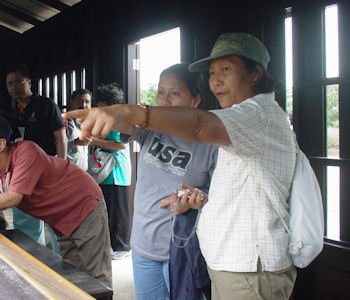
Since the press release about the Ramsar Wetland Conservation Awards by the Ministry of Natural Resources and Environment in July 2008, I have been interviewed by many various media including newspapers, television and radio networks. These provide me with opportunities to talk more about wetlands, about how wetland ecosystems are important for people’s livelihoods and the socioeconomic as well as ecological well-being of the country, and why we should pay more attention to maintaining and rehabilitating our natural wetlands. Many friends, colleagues, communities, and schools also called me and shared their views and feelings.
I will continue working on supporting and promoting wetland educational activities for children and youth; enhancing public awareness of wetland values; capacity building in wetland management; and policy-oriented research to support the integration of wetland conservation into development. One thing I am working on is compiling regionwide case studies to demonstrate that wetland conservation and sustainable development can co-exist. I will continue working on wetland-related culture and promoting applications of cultural tools in wetland management; building a women’s network for wetland management; and expanding the existing university network for wetland research and trainings in the Mekong region to other parts of Asia and wider.
Have you a brief summary message about the importance of wise use of wetlands in the present and coming world?
In the present and coming world, wetlands and wetland resources will become more and more important for people’s subsistence livelihoods, especially food, water, health, life and property security, social well-being and welfare, and global ecological balance. We are living with and facing more and more serious natural and human-induced threats. The maintenance of existing natural wetlands and wise use of wetlands will be vital for all countries.
Thank you very much for your time.
Thank you.
-- interview by Ramsar staff
